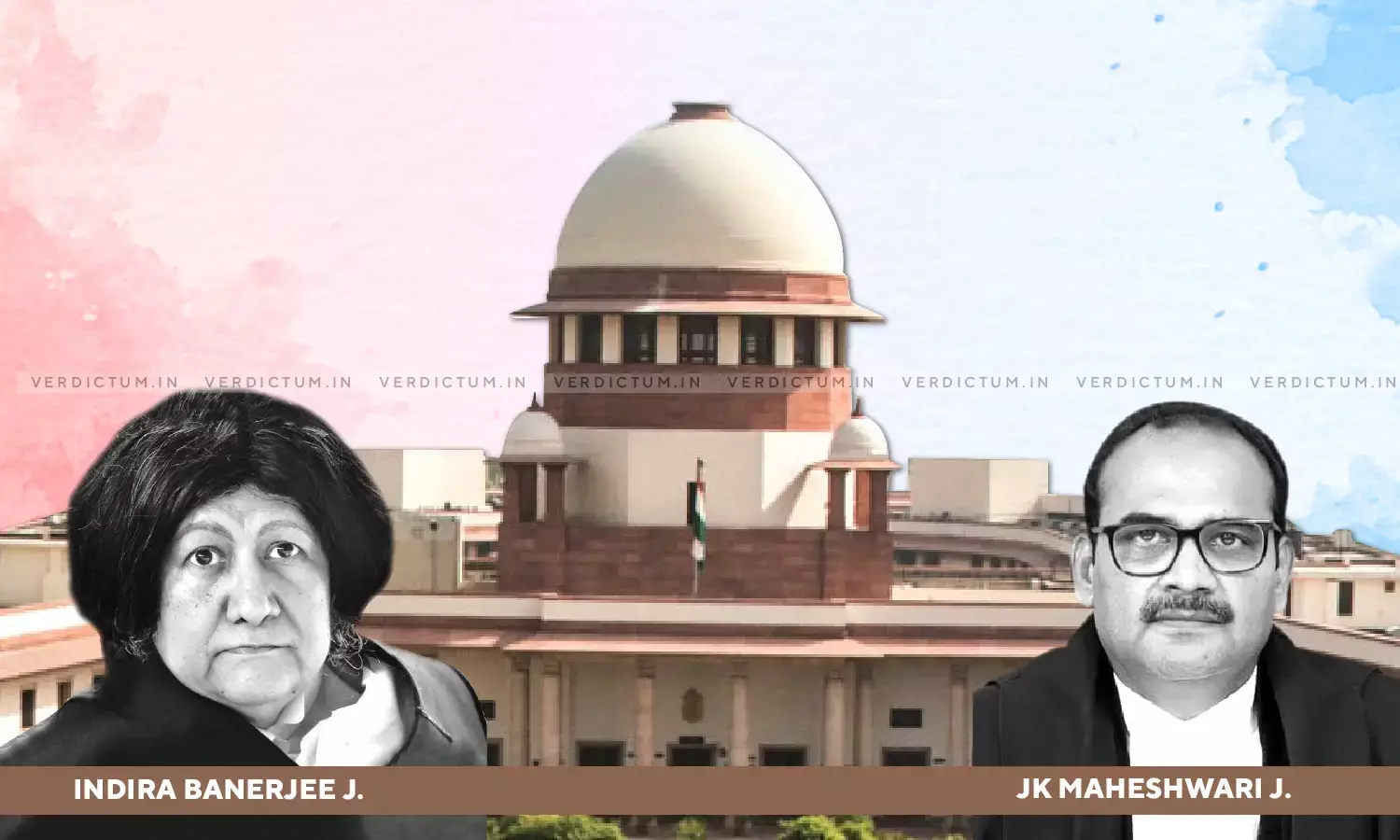Section 7 IBC - Security Documents Can Be Filed At Any Time Until Application For CIRP Is Dismissed - SC Reiterates
Section 7 IBC - Security Documents Can Be Filed At Any Time Until Application For CIRP Is Dismissed - SC Reiterates

The Supreme Court bench comprising Justice Indira Banerjee and Justice J. K. Maheshwari allowed an appeal filed under Section 62 of the Insolvency and Bankruptcy Code by Kotak Mahindra Bank Limited and set aside an order of the National Company Law Appellate Tribunal and asked the NCLAT to consider Corporate Insolvency Resolution Process Application afresh.
The Court while placing reliance on the precedent Dena Bank (Now Bank of Baroda) v. C. Shivakumar Reddy and Another held, "This Court is of the view that the Appellate Tribunal (NCLAT erred in closing the CIRP proceedings without giving the Appellant Financial Creditor the opportunity to explain if there was sufficient cause for the delay in approaching the NCLT. An appeal being the continuation of original proceedings, the provision of Section 7(5)(b) of the IBC, of notifying the Financial Creditor before rejection of a claim, would be attracted. If notified of the proposal to close the proceedings, the Appellant Financial Creditor might have got the opportunity to rectify the defects in its application under Section 7 by filing additional pleadings and/or documents. As held in Dena Bank (supra), documents can be filed at any time until the application for CIRP is finally dismissed."
The Creditor/Appellant sanctioned loan facilities to the Corporate Debtor/Respondent from time to time since November 2012. At the meeting of the Board of Directors of Corporate Debtor resolution was adopted authorizing Mr. Munish Kumar Bhunsali to execute loan and security documents on behalf of the Corporate Debtor. On November 29th, 2012 necessary documents regarding loans were executed and loan amounts were disbursed.
On May 27th, 2013, further loan and security documents were executed between the Appellant Financial Creditor and the Corporate Debtor and by a Memorandum of Deposit executed by the Corporate Debtor through Mr. Munish Kumar Bhunsali, the Corporate Debtor mortgaged its assets in favour of the Appellant Financial Creditor. By a letter of sanction, the Appellant Financial Creditor sanctioned loan facilities aggregating Rupees Rs.2036.00 Lakhs to the Corporate Debtor.
According to the Appellant, the Respondent defaulted in making repayment of its dues to the Financial Creditor. The Appellant Financial Creditor, therefore, declared the Account of the Corporate Debtor as NPA. On October 9th, 2015, the loan was recalled by the Appellant Financial Creditor. On November 19th, 2017, the Appellant Financial Creditor issued statutory notice under Section 13(2) of SARFAESI Act.
The Respondent admitted its liability to the Appellant Financial Creditor and offered one time settlement of Rupees Fifteen Crore which was later increased to Rupees Twenty Crore and was again increased to Rupees Twenty Four Crore Fifty Five Lakh which was accepted by the Appellant. The terms of the Settlement were signed to be paid. The Respondent failed to pay the amount and thus the Appellant filed Application in NCLT.
The NCLT admitted the petition and imposed a moratorium in terms of Section 14 of the IBC and also appointed an Interim Resolution Professional. The suspended directors of the Debtor approached the NCLAT which released the Corporate Debtor from the Corporate Insolvency Resolution Process. All actions taken by the Interim Resolution Professional and 'Committee of Creditors', if any, were declared illegal and set aside. Thus, the Appellant approached the Supreme Court.
The Court observed that "The scheme of the IBC is to ensure that when a default takes place, in the sense that a debt becomes due and is not paid, the Corporate Insolvency Resolution Process begins. Where any corporate debtor commits default, a financial creditor, an operational creditor or the corporate debtor itself may initiate Corporate Insolvency Resolution Process in respect of such corporate debtor in the manner as provided in Chapter II of the IBC."
It was also observed by the Court that, "The IBC is not just another statute for recovery of debts. Nor is it a statute which merely prescribes the modalities of liquidation of a Corporate body, unable to pay its debts. It is essentially a statute which works towards the revival of a Corporate body, unable to pay its debts, by appointment of a Resolution Professional."
The Court allowing the appeal observed that the adjudicating authority proceeded on the basis of the offer of settlement made by the Corporate Debtor on 12th December 2018 and rejection thereof and had not considered any other settlement. It held that, "The Appellate Tribunal (NCLAT) also did not notice the terms of settlement stated to have been executed on 20th December 2018, possibly because the attention of the NCLAT was not drawn to any terms of the settlement. The Appellate Tribunal (NCLAT) did not, therefore, have the occasion to consider whether Section 25(3) of the Contract Act would be attracted. The Appellate Tribunal (NCLAT), proceeded on the basis that the CIRP proceedings were barred by limitation in the absence of any acknowledgement of debt within the period of limitation, and closed the CIRP proceedings in the NCLT, without considering the question of applicability of Section 5 of the Limitation Act for condonation of delay, to proceedings under Section 7 of the IBC."
Cause Title - Kotak Mahindra Bank Limited v. Kew Precision Parts Private Limited & Ors.
Click Here to Read/Download Judgment

